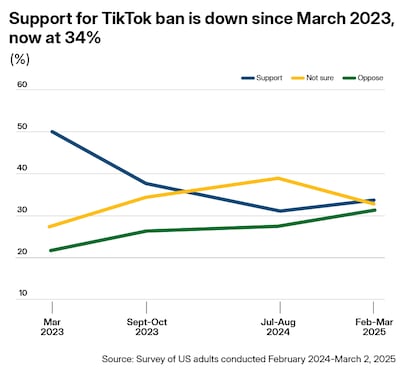New polling shows that US support for a ban on TikTok has fallen, but that might not matter if ByteDance, a China-based company does not completely sell the social platform by April 5.
According to Pew Research, support for the TikTok ban now hovers around 34 per cent, down from 50 per cent when the poll was first taken in 2023.
What has not changed, according to the poll, is that most of those who still support the ban quote potential national security issues posed by China having access to US users' data.
Therein lies the problem for ByteDance, which has not indicated it is willing to fully sell TikTok.

It is also a problem for elected officials like Republican Representative John Moolenaar, chairman of the House Select Committee on China, which has largely supported a ban on TikTok citing national security concerns because of the platform's Chinese ownership.
“If ByteDance stays involved in any way, the deal is illegal – plain and simple,” Mr Moolenaar said at an event called How to save TikTok and Protect US National Security.
“A bad deal would lead to legal chaos, damage investor confidence, and set a dangerous precedent for foreign control of US tech,” he continued. “There’s still time for a ‘deal of the century’ – but only one that fully complies with the law.”
On the other side of the aisle are Democratic senators Ed Markey, Chris Van Hollen and Cory Booker, who, unlike Rep Moolenaar, do not support the TikTok ban, but also do not support the various compromise ideas being floated by the Trump administration.

One of those ideas mentioned by the three Democratic senators in a letter to President Donald Trump is that US tech giant Oracle would take over some of the responsibility for operating TikTok, but allow for ByteDance to retain some ownership.
“If you intend to proceed with the reported Oracle deal, we urge you to work with Congress to propose modifications to the Protecting Americans’ Data from Foreign Adversaries Act to ensure that any Oracle deal prevents TikTok from going dark,” they wrote.
They also expressed disappointment towards Mr Trump, who they said overstepped Congress with his decision to extend ByteDance's deadline for selling TikTok with an executive order shortly after his inauguration.
At that time, ByteDance simply refused sell TikTok, and went dark for US users just ahead of the original January 19 deadline.
Mr Trump had the option of exercising a 90-day extension for ByteDance based on the legislation that pushed for divestment, but instead opted for a 75-day extension through an executive order.
“This prescribed non-enforcement of the TikTok ban was not only unlawful but also raised serious questions about TikTok’s future, as the law imposes liability – up to $850 billion – on companies for facilitating TikTok’s continued operations in the United States,” they wrote, referring to companies like Apple and Google who offer the social platform in their mobile app stores.
The three senators also told Mr Trump that the currently floated idea of bringing in Oracle to help run TikTok, does not satisfy the original legislation.
Instead, senators Markey, Van Hollen and Booker asked Mr Trump to support their proposed Extend the TikTok Deadline Act that they say gives more constitutional clarity for keeping the app operating while a potential compromise is worked out.
Meanwhile, ByteDance has spent the time ahead of the April 5 deadline trying to win the hearts and minds of Americans through TV, billboard and web ads showing the positive economic impact TikTok has on small US businesses.
“Seven million US businesses rely on TikTok to compete,” says a narrator in one of TikTok's TV advertisements, showing people working in various capacities and using the platform.
Based on the recent polling from Pew Research, those ads seem to be working, yet they are not winning over legislators like Rep Moolenaar, who is perhaps one of most important voices on the issue, calling the ads a distracting PR campaign.
“We’ve seen this before with Project Texas – ByteDance promised to protect US user data by storing it domestically, but it still controlled the platform and data still flowed to China,” he said, unmoved by the shift in public opinion.
The Trump administration has not released details about negotiations with ByteDance and potential US investors seeking control over TikTok.
On the campaign trail, the President vowed to keep the app running.
While talking to reporters in the Oval Office last week, Mr Trump implied he may ease upcoming tariffs on China to secure a deal for the divestment of TikTok ahead of the April 5 ban.
“Every point in tariff is worth more money than TikTok,” he said, floating the idea to reporters. “It sounds like something I'd do.”
TikTok did not respond to requests for comment, but the company has repeatedly insisted that US user data is not compromised by ByteDance's China ownership.
As for its chief executive, Shou Zi Chew, he has been largely silent since his company received Mr Trump's lifeline.
His last message on the topic was posted as a TikTok video back on January 17, shortly after the Supreme Court upheld the law forcing ByteDance to sell the platform.
“Rest assured we will do everything in our power to ensure that our platform thrives as your online home for limitless creativity and discovery,” he said.
On Sunday during an interview aboard Air Force One, President Trump expressed optimism that a deal with ByteDance would be reached.
"We have a lot of potential buyers," he told reporters. "I'd like to see TikTok remain alive."

